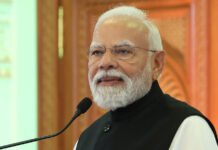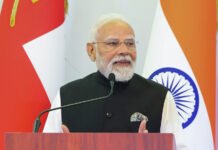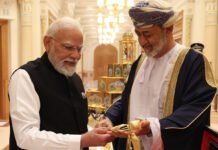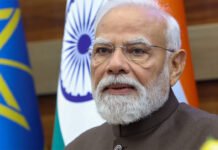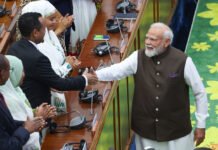In the latest episode of ‘Mann Ki Baat’, Prime Minister Narendra Modi highlighted the critical importance of preserving India’s ancient manuscript heritage. He placed special emphasis on the Gyan Bharatam Mission, a government initiative dedicated to the digitization of ancient manuscripts, and praised Mani Maran, a passionate preserver of Tamil culture from Thanjavur, Tamil Nadu, for his extraordinary work with palm-leaf manuscripts.
India’s Manuscript Heritage: A Treasure Beyond Time
India’s intellectual tradition spans millennia, with knowledge preserved in the form of palm-leaf manuscripts, birch bark, and other traditional mediums. These ancient texts cover subjects as diverse as Ayurveda, astronomy, mathematics, music, language, philosophy, and spirituality.
Prime Minister Modi reminded the nation that these manuscripts are not merely documents—they are living memories of our civilizational wisdom. Thousands of texts remain untouched, scattered in personal collections, temple libraries, and ancient educational institutions, waiting to be rediscovered and revived.
Mani Maran: The Guardian of Tamil Suvadiyal
Among the silent warriors working to preserve this vast knowledge is Mani Maran of Thanjavur, a man whose devotion to Tamil manuscripts has sparked a local cultural revival. PM Modi’s acknowledgment of Maran during the ‘Mann Ki Baat’ broadcast brought national attention to this grassroots movement of cultural conservation.
Realizing the declining ability of modern generations to read Tamil Suvadiyal—the art of reading ancient palm-leaf manuscripts—Maran initiated evening classes in his town. These classes became an intergenerational hub for students, youth, and scholars eager to reconnect with their roots. Today, many of his students are proficient in Tamil Suvadiyal and have begun research into Siddha medicine and ancient Tamil literature, revitalizing knowledge that was on the verge of extinction.
Gyan Bharatam Mission: Digitizing India’s Intellectual Legacy
PM Modi unveiled a landmark policy in the 2025 Union Budget—the Gyan Bharatam Mission. This mission will oversee the systematic digitization of ancient Indian manuscripts and establish a National Digital Repository, enabling scholars across the globe to access and study India’s knowledge systems.
The repository will act as a centralized, searchable archive, ensuring that India’s civilizational wisdom is not only preserved but actively studied and integrated into contemporary research and innovation. Under this initiative:
Thousands of manuscripts from across India, including those in Sanskrit, Tamil, Pali, Prakrit, and other languages, will be scanned and uploaded.
Metadata indexing will make it easier for researchers to locate texts by topic, author, or region.
AI-based tools may be employed to aid in transcription and translation.
Cultural institutions, universities, and private collectors will be encouraged to contribute to the national repository.
Manuscripts: The Soul of Bharat’s Civilizational Identity
PM Modi underlined that manuscripts are not relics—they are dynamic reservoirs of ancient intelligence. Texts on Vastu Shastra, cosmology, ecological wisdom, and mind-body balance continue to offer solutions relevant to modern challenges. The Gyan Bharatam Mission represents not just a technological initiative but a cultural renaissance.
“We are not just digitizing ink and parchment,” Modi said, “We are restoring our connection to the soul of India.”
The Role of Youth in Cultural Preservation
PM Modi’s praise for Mani Maran served as a clarion call to India’s youth. In Maran’s work lies a replicable model: empowering the next generation to become custodians of our ancient wisdom. His evening classes began with a simple vision but have since transformed into a thriving educational movement, with students now deciphering, restoring, and translating ancient palm-leaf texts.
The involvement of youth has been transformative:
Many students now pursue academic research in traditional medicine, linguistics, and philosophy.
Others are training to become instructors, multiplying the impact.
Some have begun to digitize and annotate manuscripts themselves, directly contributing to the Gyan Bharatam initiative.
Tamil Nadu: A Cradle of Knowledge
Tamil Nadu, with its centuries-old tradition of learning, temples, and scriptural preservation, plays a pivotal role in the Gyan Bharatam ecosystem. Places like Thanjavur, Madurai, and Kanchipuram house countless undiscovered manuscripts. The Saraswathi Mahal Library in Thanjavur, where Maran often references materials, is one of the world’s oldest repositories of palm-leaf texts.
The government’s push to digitize these libraries means that regional language knowledge systems, often overshadowed by classical Sanskrit texts, will now receive equal attention. This linguistic inclusivity is vital for preserving India’s diverse intellectual fabric.
How the Public Can Participate
Prime Minister Modi urged citizens to contribute to the preservation movement:
Identify family-owned manuscripts and register them with the Ministry of Culture.
Collaborate with NGOs, libraries, and institutions already digitizing texts.
Share expertise on translation, restoration, preservation, or coding and archiving.
Use platforms like MyGov.in to connect with ongoing projects.
Inspire youth through community-based learning modules, much like Maran’s evening classes.
A National Mission with Global Relevance
The Gyan Bharatam Mission is not only of national importance but has global academic implications. India’s ancient texts hold immense potential for research in:
Linguistics and phonetics
Comparative mythology
Traditional healthcare systems
Environmental and ecological sciences
Philosophy and ethics
Scholars around the world are watching closely as India undertakes this digitization drive. By creating a multilingual, multimedia platform, the government seeks to make India’s timeless knowledge universal and future-facing.
From Preservation to Rebirth: The Future of Indian Manuscripts
This movement is no longer about simply safeguarding the past. The digitization, teaching, and integration of manuscript-based wisdom into modern life and policy can lead to a cultural resurgence. With the Gyan Bharatam Mission, India is positioning itself not only as the land of ancient wisdom but also as the global leader in knowledge preservation and innovation.
Conclusion: Echoes of the Past, Pathways for the Future
Prime Minister Modi’s heartfelt tribute to Mani Maran and his announcement of the Gyan Bharatam Mission mark a defining moment in India’s intellectual journey. As we digitize our heritage and encourage new generations to engage with it, we are creating a bridge between our glorious past and a visionary future.
Let this mission be a call to every Indian—to not only honor our ancient knowledge systems but to revive them, share them, and let them guide us toward a more enlightened and sustainable world


